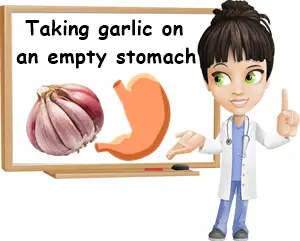Eating garlic on an empty stomach in the morning is a common practice, especially among those who consider themselves health-conscious. It is believed that taking garlic before any food allows for the health-promoting properties of the cloves to produce their most potent effect. But despite scientifically-proven health properties, garlic is not medicine and its effects are not as potent, whether it’s eaten on an empty stomach in the morning, before another meal of the day or after eating. On the contrary, taking garlic on an empty stomach, in the morning or some other time during the day, can be a source of side effects, especially for those with existing digestive issues such as acid reflux disease, gastritis or ulcers.
Why is it good to eat garlic on an empty stomach?
The supposed benefits of eating raw garlic or taking garlic pills or supplements on an empty stomach in the morning are taken from the list of properties attributed to the cloves. For example, studies have shown garlic to have natural antibiotic properties, so the cloves are consumed to obtain an antibiotic effect (especially in colds, earaches or ear infections, bronchitis and more). Studies have also proven garlic holds anticancer properties, so people who eat it do it to enjoy protection from the disease. Garlic is also promoted as a digestive aid, to stimulate appetite, for constipation and stress relief, diarrhea, hemorrhoids, liver health and cardiovascular benefits such as lowering high blood pressure. But there is no study or official statement from health authorities that says eating garlic on an empty stomach delivers any of these benefits to the consumer. Because it doesn’t.

Why on an empty stomach?
There are many theories, and I stress ‘theories’. For one, the lack of competition from other foods allows the stomach to only process the biologically active compounds in garlic, and do so better, resulting in more potent health effects. Furthermore, the absence of food means no other vitamin or substance can alter or compete for absorption with the biologically active compounds in the cloves, allowing for optimal results. Some of the most outrageous theories purport that bacteria and other pathogens are more sensitive to the antibiotic and antimicrobial compounds in the cloves in the morning before breakfast; or that, needing to feed and the stomach being empty, they will hungrily take up the garlic which has proven antibiotic and antimicrobial properties which destroys them.
Garlic and stomach health: the truth
What really happens after eating garlic on an empty stomach? If you do it once, nothing much, except maybe for bad breath. If you do it repeatedly, then it can cause digestive upset ranging from mild to severe. If you are already experiencing frequent acid reflux, heartburn, or have been diagnosed with GERD, gastritis or a stomach ulcer, then there will be side effects for sure and, chances are, existing conditions will get worse. The more garlic you eat at once, and the more frequently you eat it, the more debilitating the stomach hurt and associated side effects. The absence of food in the stomach is another aspect that contributes to the side effects and their severity.
- Side effects of too much garlic
The side effects of eating too much garlic on an empty stomach (whether it’s too much at once or small amounts, but every day), include include stomach hurt, bloating, cramps, mouth filling with saliva and associated nausea, both signs of vomiting, heartburn from the acid reflux, regurgitation of stomach juices into the mouth, bad breath, bad taste in the mouth – bitter, acidic, metallic or garlic-like, burping and even flatulence or diarrhea. Basically, eating garlic on an empty stomach hurts the stomach the most, as well as negatively impacts digestive health in general, especially if it’s eaten every day or almost every day for a long time. See the 8 side effects of eating garlic.

Of course, there will be those who say they eat a lot of garlic every day and don’t feel anything. First off, nobody eats it every day, or all the time, even if they like to think so. Secondly, some people live with conditions such as GERD or acid reflux disease for years which causes them to get accustomed to a certain level of stomach upset. There are also those who are asymptomatic, which not only causes them to keep eating foods that are bad for them, but also increases their risk for diseases of the digestive tract – because, if you can’t tell if what you’re eating is making you sick, you will continue to eat it.
Why is garlic on an empty stomach bad for you?
The reason why it’s bad for you, especially if you have stomach problems such as GERD or acid reflux, gastritis or a stomach ulcer, is because garlic is an irritant. The same compounds that are responsible for its beneficial properties are also irritants, and that’s a scientifically proven fact. If you’re not convinced by science, then think about why garlic stings/burns the tongue when you crush it in your mouth, and the longer it’s in contact with the tongue or any other area of the inside of your mouth, the stronger the stinging/burning sensation becomes. Think about why it burns when it’s rubbed on a wound, a scratch, acne or even perfectly healthy skin.
Garlic can be such a strong irritant that it can even cause blisters when you rub it on mucous membranes or skin, damaged or not. Garlic-derived products make the best natural insecticides. Then how can it possibly be a cure for stomach upset? The answer is it’s not. If you have stomach upset and eat garlic for it, especially on an empty stomach, you are actually making it worse.
Garlic and honey on an empty stomach
It’s believed that by taking both garlic and honey on an empty stomach in the morning, you get double the benefits. Because both are extremely healthy foods and honey has a consistency and nutritional profile that makes it soothing and calming on mucous membranes. While they are both healthy foods indeed, garlic is still an irritant and honey doesn’t cancel cancel out its irritant properties; at most, it masks them to some extent. So when you feel that strong garlic burp coming out or feel warm in the middle of the chest, know that the honey didn’t do anything to balance out the irritant. But you can safely have honey on an empty stomach in the morning (unless you’re allergic), and enjoy better digestive health. Choose your favorite honey variety on the Honey Page.
Conclusion
Everyone is free to do what they want, including eat garlic on an empty stomach, in the morning, afternoon or at night, for as long as they want, for whatever reason they want. But that doesn’t change the fact that the cloves we put so much hope in do not generate visible, measurable health effects, or provide life-changing health benefits. On the contrary, given their irritant properties, the cloves are actually a source of side effects, particularly for those of us with existing digestive disorders. And since excesses are never good for health, eating too much garlic or eating it too often, whether on an empty or full stomach, will ultimately also affect those for whom it’s otherwise a healthy food and a source of benefits only.
